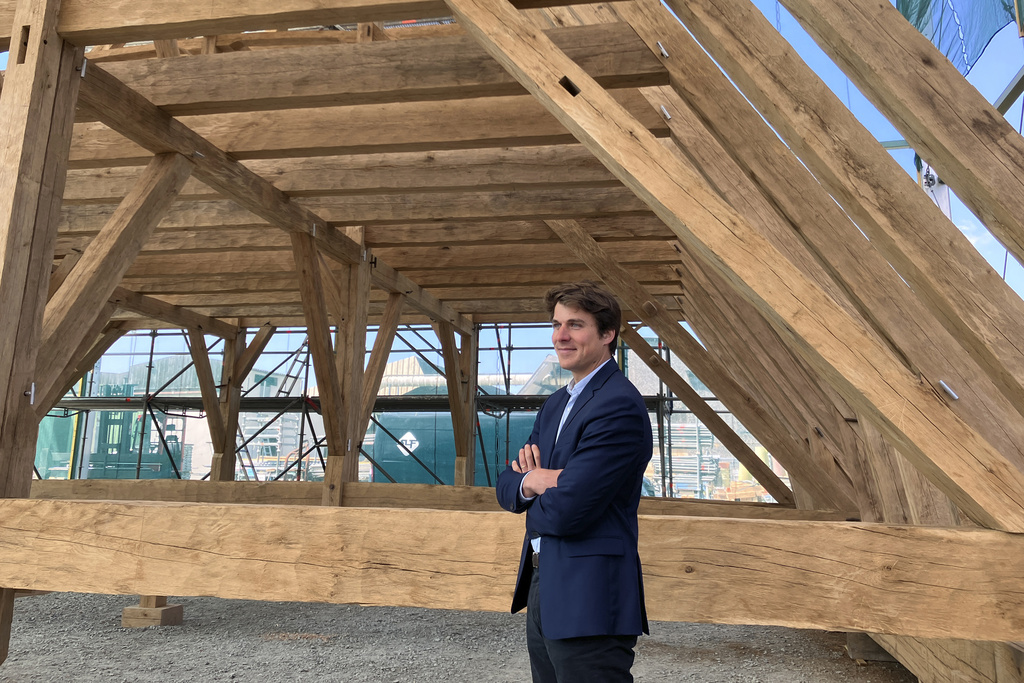A ‘Resurrection’ at Notre Dame as Fire-Ravaged Roof Gets Rebuilt Using Medieval Techniques
Carpenters are working with hand axes to fashion hundreds of tons of oak beams for the framework of the cathedral’s new roof, a process some see as rewinding time.

SAINT-LAURENT-DE-LA-PLAINE, France — If time travel was possible, medieval carpenters would surely be amazed to see how woodworking techniques they pioneered in building Notre Dame Cathedral more than 800 years ago are being used again today to rebuild the world-famous monument’s fire-ravaged roof.
Certainly the reverse is true for the modern-day carpenters using medieval-era skills. Working with hand axes to fashion hundreds of tons of oak beams for the framework of Notre Dame’s new roof has, for them, been like rewinding time. It’s given them a new appreciation of their predecessors’ handiwork that pushed the edge of the architectural envelope back in the 13th century.
“It’s a little mind-bending sometimes,” says one of the carpenters, Peter Henrikson. He says there are times when he’s whacking mallet on chisel that he finds himself thinking about medieval counterparts who were cutting “basically the same joint 900 years ago.”
“It’s fascinating,” he says. “We probably are in some ways thinking the same things.”
The use of hand tools to rebuild the roof that flames turned into ashes in 2019 is a deliberate, considered choice, especially since power tools would undoubtedly have done the work more quickly. The aim is to pay tribute to the astounding craftsmanship of the cathedral’s original builders and to ensure that the centuries-old art of hand-fashioning wood lives on.
“We want to restore this cathedral as it was built in the Middle Ages,” says the retired French army general who is overseeing the reconstruction, Jean-Louis Georgelin.
“It is a way to be faithful to the (handiwork) of all the people who built all the extraordinary monuments in France.”
Facing a tight deadline to reopen the cathedral by December 2024, carpenters and architects are also using computer design and other modern technologies to speed the reconstruction. Computers were used in the drawing of detailed plans for carpenters, to help ensure that their hand-chiseled beams fit together perfectly.
“Traditional carpenters had a lot of that in their head,” Mr. Henrikson notes. It’s “pretty amazing to think about how they did this with what they had, the tools and technology that they had at the time.”
The 61-year-old American is from Grand Marais, Minnesota. The bulk of the other artisans working on the timber frame are French.
The roof reconstruction hit an important milestone in May, when large parts of the new timber frame were assembled and erected at a workshop in the Loire Valley, in western France.

The dry run assured architects that the frame is fit for purpose. The next time it is put together will be atop the cathedral. Unlike in medieval times, it will be trucked into Paris and lifted by mechanical crane into position. Some 1,200 trees have been felled for the work.
“The objective we had was to restore to its original condition the wooden frame structure that disappeared during the fire of April 15, 2019,” says architect Remi Fromont, who did detailed drawings of the original frame in 2012.
The rebuilt frame “is the same wooden frame structure of the 13th century,” he says. “We have exactly the same material: oak. We have the same tools, with the same axes that were used, exactly the same tools. We have the same know-how. And soon, it will return to its same place.”
“It is,” he adds, “a real resurrection.”
